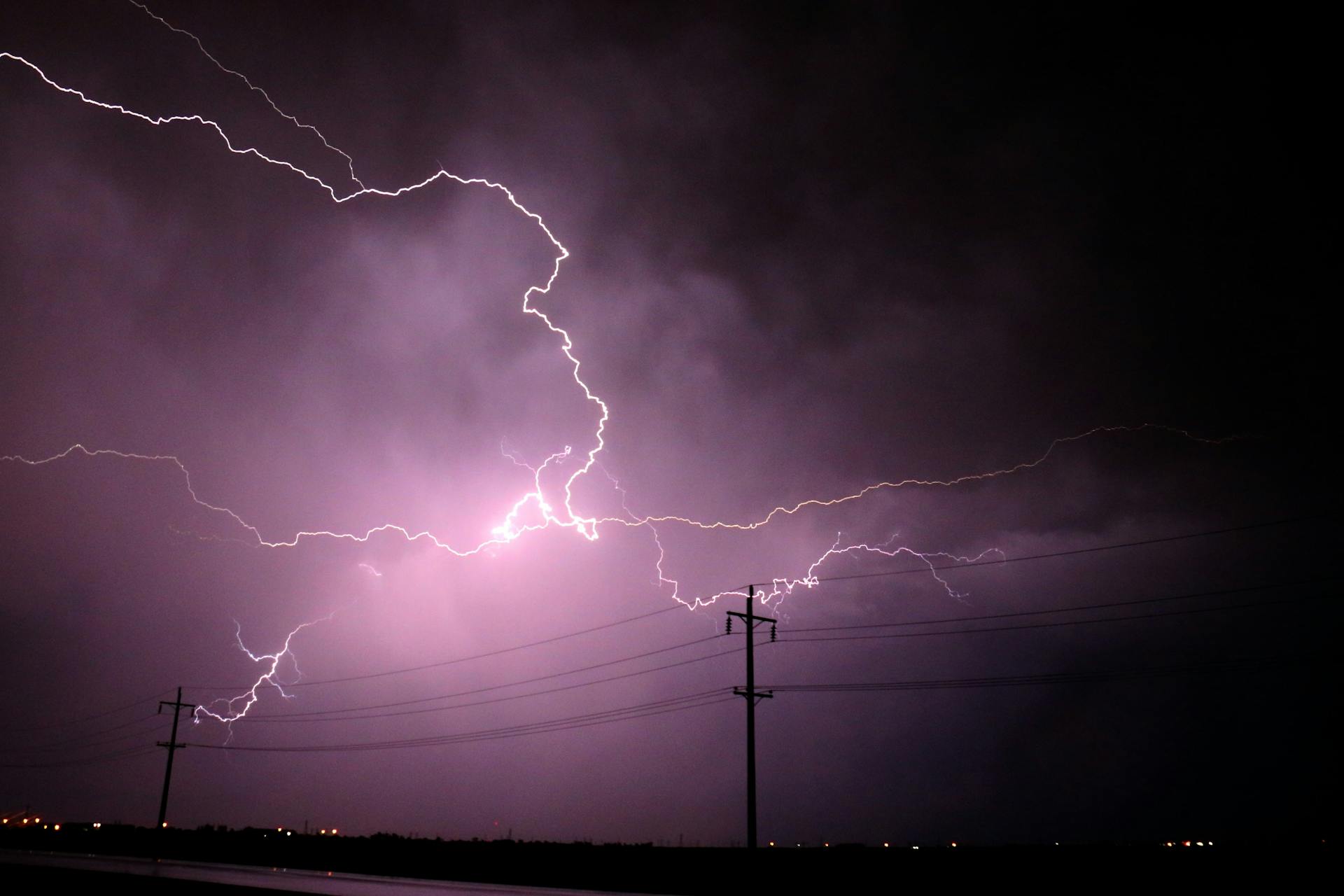
Homeowners insurance can be a lifesaver during power outages, but does it actually cover them? The answer is a bit more complicated than a simple yes or no. Most standard homeowners policies cover damage to your home and belongings caused by power outages, but only if the outage is caused by a covered peril, such as lightning or a fallen tree.
If a power outage is caused by a utility company's equipment failure, your insurance may not cover the damage to your home or belongings. In fact, utility companies are often responsible for their own equipment and infrastructure, so you may need to file a claim with them directly.
Your policy may also have specific provisions for power outages, such as a separate deductible for electrical damage. This means you'll need to pay a higher deductible if you file a claim for damage caused by a power outage.
Explore further: Power Surge Insurance Claim
What Influences Homeowners Coverage?
Your homeowners insurance policy is unique to your situation, and several factors influence the coverage you receive. Policy inclusions and exclusions can vary greatly, so it's essential to read your policy carefully.
Common exclusions might include food spoilage due to a power outage or losses that are considered preventable with proper maintenance. This means you should review your policy to know what's covered and what's not.
Your geographical location plays a significant role in determining your coverage needs. If you live in an area prone to hurricanes, your policy might offer specific protections for hurricane-related outages.
Regularly reviewing and updating your insurance policy is crucial to ensure you have the coverage you need. Life changes, home upgrades, and new personal belongings can all affect your coverage needs.
You can customize your coverage by purchasing additional riders or endorsements, which can offer extra protection for specific scenarios not covered by your standard policy. Discussing these options with an insurance agent can help you tailor your coverage to your unique needs.
If this caught your attention, see: What Does Homeowners Insurance Cover and Not Cover
Coverage for Power Outages
Standard home insurance policies may not cover food spoilage caused by a power outage unless you have additional coverage or endorsements explicitly addressing this scenario.
Typically, homeowners insurance policies have exclusions for losses deemed preventable or those resulting from poor maintenance of home equipment.
To ensure you're adequately protected, it's crucial to review your policy details and consider adding a rider that covers food spoilage.
Equipment breakdown coverage can extend to appliances, home systems, and smart home devices damaged due to power surges or other factors.
This coverage comes with no per-item limit and a lower deductible, making it a great option for additional peace of mind if you can afford it.
Check this out: Does Renters Insurance Cover Power Surges
Preparing for Power Outages
Preventing power outages starts with taking preventive measures. Consider installing surge protectors to safeguard your electronics and maintaining backup power sources like generators.
Having a thorough house inventory can assist you in determining whether you have adequate insurance. This inventory can also make it easier to file a claim if the need arises.
Documenting all losses and damages meticulously is crucial when filing a claim. This documentation provides evidence of the extent of your losses.
Understanding your homeowners insurance coverage regarding power surges is crucial for protecting your home and possessions. Review your policy details and consult with your insurance provider to take preventive measures.
Installing a lightning protection system can help safeguard your house. Unplugging appliances susceptible to electrical items like computers during a storm is also a good idea.
Being proactive can help ensure that your home remains safe and secure against unexpected electrical issues.
Additional reading: Does Home Insurance Cover Electrical Problems
Understanding Coverage
Homeowners insurance policies typically contain a variety of coverage options, including personal property coverage, which may assist in replacing your items if a covered risk damages them.
Coverage varies by policy, so it's critical to study your policy or contact your insurance representative carefully. According to the Insurance Information Institute (III), some - but not all - homeowners' policies cover power surges caused by direct lightning strikes on your property.

Most homes policies protect against abrupt, accidental harm caused by man-made energy, however, the III cautions that some insurers exclude coverage for tubes, transistors, and other electrical components. Examine your policy details to see what is and is not covered in your house.
Some common exclusions might include food spoilage due to a power outage or losses that are considered preventable with proper maintenance. To enhance your coverage, you might consider purchasing additional riders or endorsements, which can offer extra protection for specific scenarios not covered by your standard policy.
Here are some key factors to consider when understanding your coverage:
- Policy inclusions and exclusions
- Additional coverage options
- Geographical location and associated risks
- Regularly reviewing and updating your insurance policy
Food Loss Coverage in Homeowners Insurance
Standard home insurance policies may not cover food spoilage caused by a power outage unless you have additional coverage or endorsements explicitly addressing this scenario.
Typically, exclusions might include losses deemed preventable or those resulting from poor maintenance of home equipment.
Reviewing your policy details is crucial to ensure you're adequately protected.

Adding a rider that covers food spoilage can provide the necessary coverage.
Policy inclusions and exclusions vary, so it's essential to read your policy carefully to know what is and isn't covered regarding power outages.
Common exclusions might include food spoilage due to a power outage or losses that are considered preventable with proper maintenance.
Discussing additional coverage options with an insurance agent can help you customize your coverage to better suit your needs.
Your geographical location and associated risks play a significant role in coverage, which can affect what's included or excluded in your policy.
Regularly reviewing and updating your insurance policy ensures you have the coverage you need, especially when life changes or new personal belongings are acquired.
Surge Damage Coverage
Surge damage coverage is a crucial aspect of homeowners insurance, and it's essential to understand what's covered and what's not. Homeowner's insurance extends to covered perils only, which includes lightning strikes and sudden accidental damage caused by artificially generated electrical currents.

If your personal belongings are damaged in a power surge caused by lightning, your insurance will cover that damage. However, if the power surge was caused by an overloaded circuit, you won't receive coverage. It's also worth noting that some homeowner's insurance policies have more than the standard covered perils, so it's a good idea to schedule a personal insurance review with your agent to discuss the specifics of your policy.
Power surge damage can be caused by a variety of factors, including lightning strikes, power outages, faulty wiring, and large appliances. A power surge is a sudden increase in electrical voltage that can last for a fraction of a second or several minutes. To minimize the impact of power surges, consider installing surge protectors to safeguard your electronics and maintaining backup power sources like generators.
If you do experience damage due to a power surge, you can file a claim with your insurance carrier to recoup your costs. To make the process easier, create an inventory of your electronics and other personal property ahead of time. This will help you determine the appropriate amount of coverage and make submitting a claim less complicated.
Here are some common exclusions to be aware of:
- Food spoilage due to a power outage
- Losses that are considered preventable with proper maintenance
- Damage caused by overloaded circuits (not covered by standard policies)
It's essential to regularly review and update your insurance policy to ensure you have the coverage you need. Life changes, home upgrades, and new personal belongings can all affect your coverage needs, so stay in touch with your insurance agent to keep your policy up-to-date.
Sources
- https://stories.simplyioa.com/does-home-insurance-cover-power-outages
- https://www.foxbusiness.com/features/when-your-power-is-out-does-homeowners-insurance-kick-in
- https://www.consumercoverage.com/blog/home-insurance/does-homeowners-insurance-cover-power-surges
- https://www.dicklawfirm.com/blog/2022/january/does-homeowners-insurance-cover-power-surge-dama/
- https://www.scavoneins.com/blog/homeowners-insurance-power-surge-coverage/
Featured Images: pexels.com


